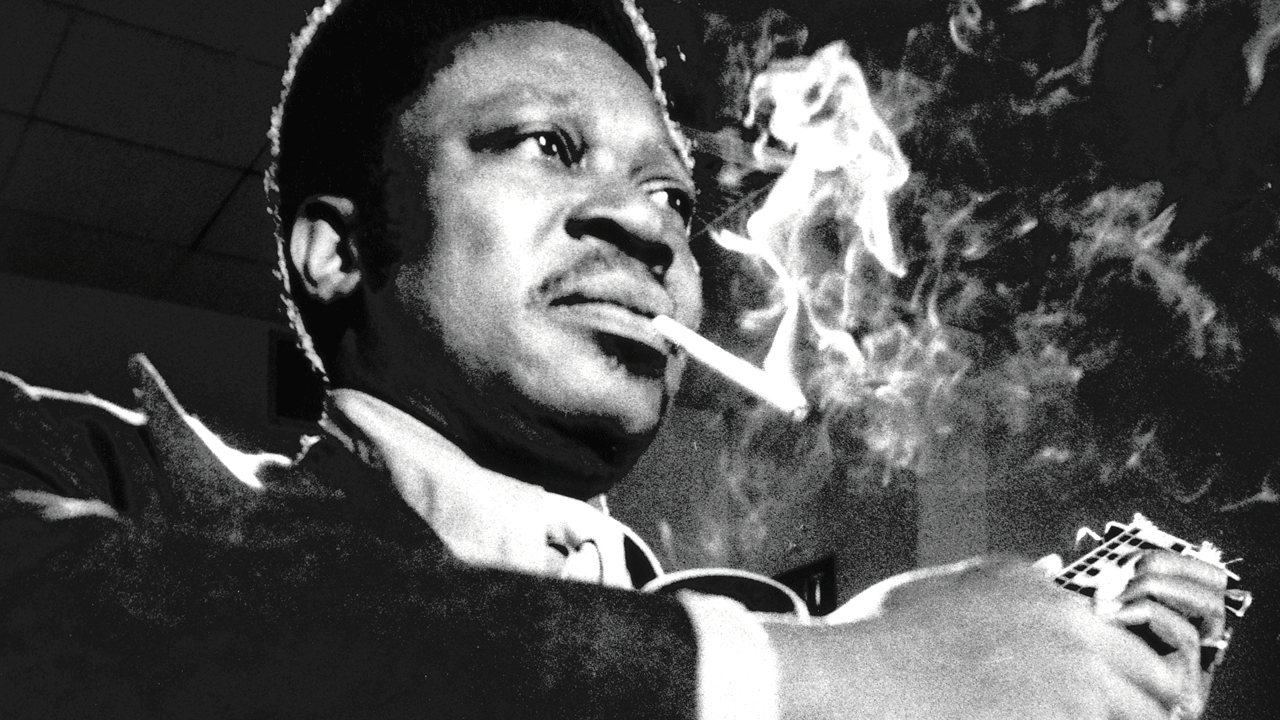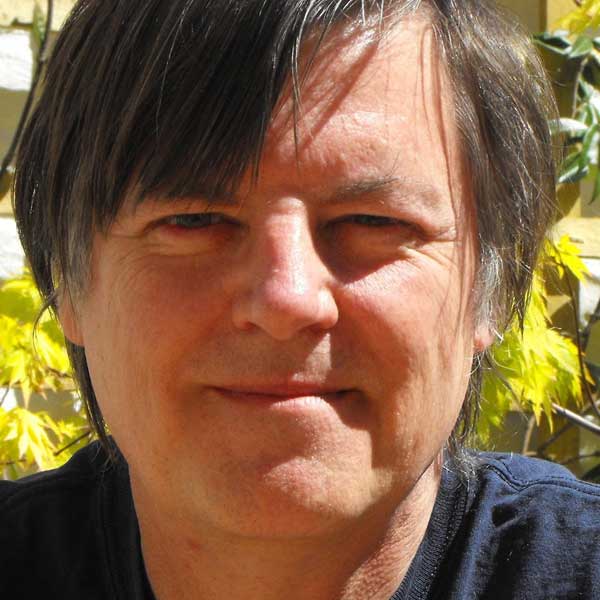After 15 years as the undisputed king of the blues, BB King released some of the strongest records of his career as the 60s drew to a close. While the two albums he recorded in 1970 – Indianola Mississippi Seeds and Live In Cook County Jail – did tolerably well on the charts there was concern among the people at his record company that someone who should be a household name was still something of a cult figure.
Across the Atlantic, however, the British blues boom was at its peak and The London Howlin’ Wolf Sessions, recorded in May 1970, had established a template whereby an American blues original might have his career reinvigorated via an association with the young bucks of the Big Smoke.
King was then with ABC Records in America, where Jay Lasker, president of its small but conspicuously successful subsidiary label, Dunhill, had been given a remit to bring the entire ABC roster into the modern era.
In the late summer of 1970, conversations between Lasker and King’s manager Sid Seidenberg had resulted in the concept of bringing the blues veteran together with some of London’s finest to see what might transpire. Not long after, Lasker picked up his phone and called Dave Chapman, the recently appointed MD of ABC-Dunhill’s UK operation, at his office in London’s Piccadilly.
Dave Chapman: “Jay and I had previously decided to use another ABC subsidiary, Probe Records, as a vehicle through which we could release some of the new projects, and the BB King album would be one of them. Jay felt that BB was so good that he should really be a household name, and selling a lot more records. He also believed BB was the best artist to bring the label back to the fore and make it more contemporary.
“Jay deserves a lot of the credit for this album, because it was him who called in Ed Michel, a highly respected veteran producer for the Impulse! label [ABC’s jazz subsidiary] plus a terrific young engineer called Joe Zagarino who had worked with The Guess Who and other contemporary acts. I used to call Ed Michel The Mad Professor. He had horn-rimmed glasses and a big black beard. He wasn’t what you’d call madly sociable, but he was a really scientific producer, very technically minded, an absolute genius with jazz, but also fantastic with blues. Ed was the top producer at ABC during that time, so the natural choice for the album. He would be up all hours of the day or night if that was what it took to make the album.
“Ed came over to London in about March 1971, and basically we sat down in our Piccadilly office and compiled a list of great players that we’d like to get involved in the album. BB then picked from that list the people he particularly wanted to play with. Then we got on the phones and starting ringing all over the world. John Lennon was one notable name that we couldn’t get because of his schedule, but we got Ringo, Klaus Voormann, and guys like the horn section of Jim Price and Bobby Keys. Then, after about 10 days, it suddenly flipped, because the word had got out and people started calling us because they all wanted to get involved.”
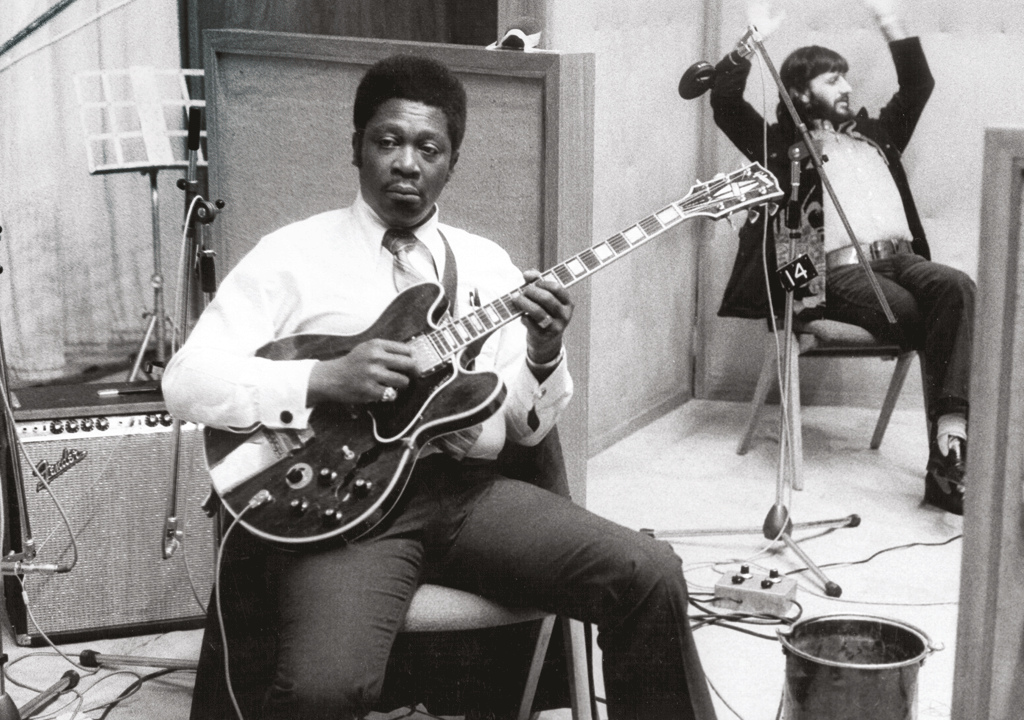
Above: Ringo Starr cheers on Mr King.
To some extent, the availability of London’s best studios dictated when the sessions could realistically be done. In the end, it came down to Olympic in west London, and Command Studios in Piccadilly just a few hundred yards from the ABC-Dunhill offices. The dates were set for June 9 to 16 1971, at which point another whittling down of the potential participants list had to be made depending on their availability.
BB King: “We asked for some British musicians to sit in with us. There was Peter Green and a whole lot of people. When we heard from Ringo, I said, ‘Oh yes, please… The Beatles.’”
Dave Chapman: “BB didn’t bring any sidemen over to London with him, but we got lucky because people like Bobby Keys and Jim Price and Dr John were already in Europe on other projects, like The Stones’ Exile On Main St album, so it was quite convenient for them to come along.”
BB King: “It was one of the greatest things that ever happened to BB King. I had many thoughts about the young musicians that had been playing blues and I wanted to hear them at first-hand. I got that chance and found that the British musicians who played with me were as good as those that had played with me back home.”
Dave Chapman: “I remember seeing Jim Keltner, a wonderful drummer, at Olympic for quite a few sessions, and I remember Ringo being there for several tracks, but other guys ended up coming in for just one particular track.”
Those “other guys” included Pete Wingfield and Paul Butler, keyboardist and guitarist respectively of the acclaimed blues-rock combo Jellybread, then signed to Britain’s foremost blues label, Blue Horizon.
Mike Vernon (owner, Blue Horizon): “I seem to remember it was all very last minute. When Dave Chapman first approached me about the album, I was hoping I might be the producer, because London was, after all, my home turf, so it would have made sense. Then I was told that Ed Michel and Joe Zagarino were being brought over, so my role was only to find musicians for the sessions.
“I brought in the guys from Jellybread, and the piano player Errol Dixon who was Jamaican and a good solid R&B/blueser. His idol was Lloyd Glenn who used to play with BB King, so it made sense to have him there. “I did think about bringing in Stan Webb of Chicken Shack, but when you’ve got BB King, you really don’t need another lead guitar player. Nor did I bring in Peter Green, because this all happened around the time when Fleetwood Mac split from Blue Horizon, so I wasn’t much in communication with them.”
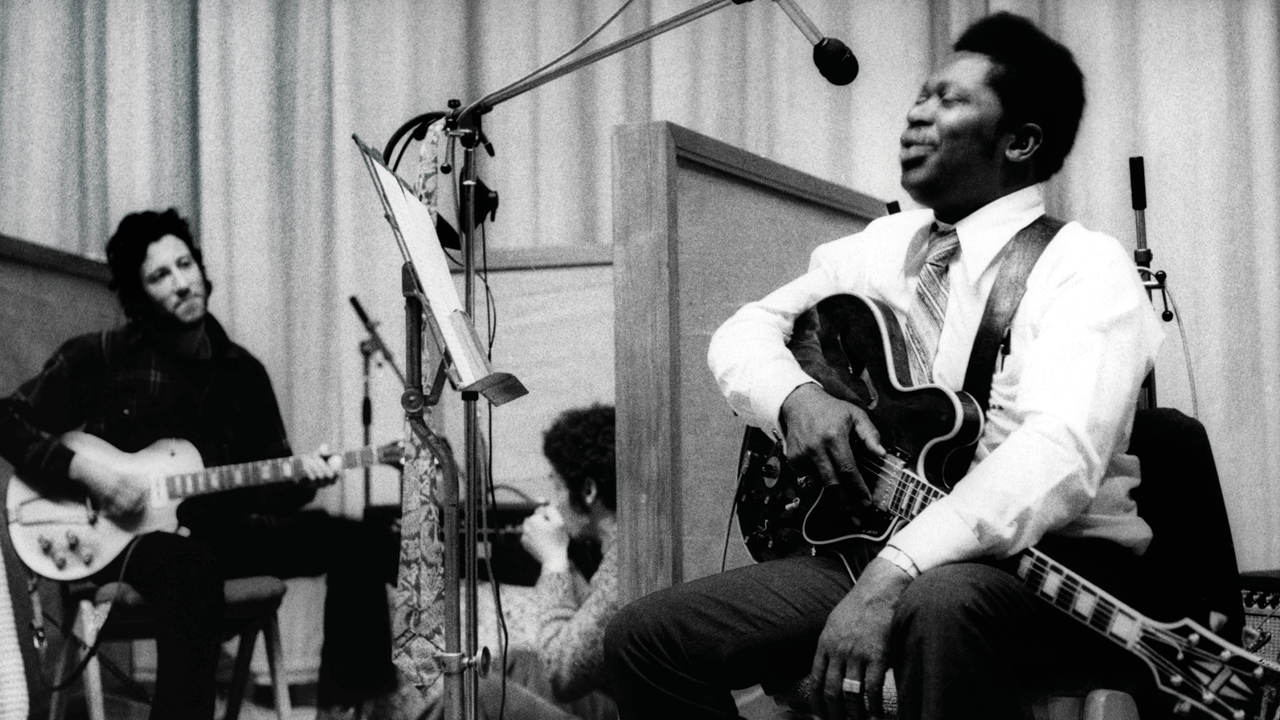
Above: Peter Green took a back seat at the sessions.
Pete Wingfield (keyboards, Jellybread): “I was 23 when we did the In London session, so still a relatively callow youth. Mike Vernon rang me the night before and asked if I could get along to Command Studios for a BB King session. Mike suggested it might be a good idea to cobble a song together so, with the brazenness of relative youth, that’s what I did. I wrote Power Of The Blues specially for that session, wrote it overnight. Started with the title and went from there. I custom-made it to the max to be suitable for BB King. For example, even then he had a reputation of being something of a road warrior, on the road 300 days a year, so that was what I built the lyric around, and a mention of Lucille, which was his guitar.
“I didn’t have time to do a demo, I just had the lyric scribbled on a bit of paper, plonked it in front of B, and he was the most amenable of gentlemen. I think he appreciated someone having an idea rather than just waiting to be told what to do. He was completely open to it and happy to fit in with my idea of how to do it.”
Paul Butler (guitarist, Jellybread): “Like Pete, I was called up the night before, and it wasn’t until I got to Command Studios that I even knew it was a BB King session. I was wearing a shirt in which I used to play rugby when I was 14, but B was wearing a jacket and tie, very old- school, very smart.
“B was just a lovely, lovely guy, but he was also absolutely switched on to the music. I’ve backed a lot of people, Lightnin’ Slim, Eddie ‘Guitar’ Burns, and they would change chords whenever they felt like it, which is fine if you’re playing solo but, in a band, everybody has to know what’s happening. Technically, BB’s music was much sharper and you realised that you had to know what you were doing. I think he knew, though, as soon as we started to play, that we’d be good working with him.
“When you play on a BB King album, he’s the man and you’re there to back him, make him sound as good as he can. The first thing we did was called something like Getting To Know You, and it was basically just a jam. It didn’t get onto the album. I think we did three or four tracks all told that day. It was a one-day session, but quite a long day. I remember Jeremy Spencer [Fleetwood Mac] was there that day, but he didn’t play.”
Dave Chapman: “BB was not only supremely talented, he was also perhaps the nicest person I met in my 25 years in the music business. I remember one day the weather was dreadful, a force-eight gale, rain hammering down. My secretary, Denise, had an umbrella so she offered to walk BB from the studio to the Dorchester Hotel, where he was staying. As they walked along the umbrella started to leak and they both got absolutely soaked by the time they reached the hotel, which BB just thought was very funny. Several months later, when the album came out, there was a note on the cover saying, ‘Thanks to Denise with the leaky umbrella’. That was typical of BB. He never forgot anybody. It absolutely made her day.”
Command was conveniently located for the ABC-Dunhill off ices, but the lion’s share of the sessions took place at Olympic Studios, where Alexis Korner, one of the godfathers of British blues, proved to be an important contributor to the proceedings.
BB King: “There was a guy from England called Alexis Korner. He was a good player. He told me he had learned to play from a fella called Big Bill Broonzy. And boy, could he play.”
Jerry Shirley (drummer, Humble Pie): “We were very close to Alexis at that time, and he needed a reliable rhythm section, so he called Steve Marriott and asked if he, Greg [Ridley, bass] and myself could play for one afternoon on the session. Steve almost collapsed. He was saying, ‘Can you?!’ because of course he wanted to do it!”
BB King: “Alexis said, ‘B, I got something I call Alexis’ Boogie and I got two fabulous acoustic guitars’. He said, ‘You ought to try it.’ So I said, ‘Okay’, and I did try it at his house and it sounded good.”
Jerry Shirley: “We arrived at the studio still uncertain of what we were going to do. We were in such a rush because the call came in on the morning of the session. It was all our roadies could do to grab the equipment, and we rushed there in a New York second. But we forgot one of my drum cases, which had my floor toms and my drum spurs, meaning I had this big 26-inch bass drum and no spurs to keep it stable. So we found these two huge stone weights with handles on them, which were usually used for keeping big studio doors open. I wedged one under each side of the bass drum. One of the roadies’ tool kits was jammed in front to keep it from moving, and that was how I played the session.
“We did a couple of tracks, but the one that stood out was Alexis’ Boogie. It was really just a lovely little lick that Alexis had, not an earth-shafting track but it has a nice little groove, and there’s something about what Alexis is playing as a counterpoint to BB’s lead that gave it a nice feel.
“In the event, Steve almost didn’t get on the track. I remember him playing some rhythm guitar parts while they were getting their ideas together, but that’s not what ended up on the track. A lot of ideas were flying around about how best to do the track, but BB and Alexis were doing the lead and rhythm guitars, so Steve ended up just playing harmonica.”
Mike Vernon: “I thought Steve Marriott’s harmonica solo was just awful, but at least I had got them Duster Bennett, who was a more capable and credible player, to appear on some of the other tracks [notably Caldonia].”
BB King: “Alexis’ Boogie was the only non-electrical playing that I had ever done on an album, and I told him then, ‘As long as you live, I will never do this again.’ And I didn’t.”
The core of the Olympic crew included Ringo Starr, Peter Green, Steve Winwood (credited for contractual reasons as The Mystery Shadow), Dr John, Rick Wright, Klaus Voormann, Duster Bennett, Jim Gordon, Jim Keltner, John Uribe, David Spinozza, Dr Ragovoy (better known as Jerry Ragovoy); the indomitable horn section of Keys and Price plus Ollie Mitchell, Bill Perkins and Chuck Findley; and a trio of back-up singers – Joshie Armstead, Tasha Thomas and Carl Hall.
BB King: “Some of the musicians had contemporary thoughts about what we should play and how we should play it, but Ringo wouldn’t allow it. He would say, ‘That’s not BB’ and I was so happy because I didn’t have to say it myself.”
Gary Wright (keyboards): “After the first song where Ringo was on drums, he went back into the control room to listen back to what we had just played. BB looked at Ringo after we heard the take and said, ‘Man, you keep time like a big clock.’”
Steve Winwood: “A fantastic recording session. BB could not have been nicer, just an absolute gentleman, very personable, modest. He was a great blues musician, but he made us feel at ease, like peers. One thing I vividly remember with his guitar playing, it didn’t matter what chords the musicians put underneath him, he made it sound great – and different. He had a certain way of transcending the chord changes, putting in his own things. Some of the blues musicians, the more rustic ones, are known for adding bars and beats here and there. But BB wasn’t like that. He was a great musician, but he still very much had his own style, his own way of voicing things. It was clear even then why he was so revered.”
Bobby Keys: “When you’re doing a lotta sessions, sometimes they all sorta blend together. But there were a few memorable ones during this period. I recorded with BB King on his In London album, for instance. That was back when sessions were fun. I played a solo on a song called Caldonia, the first song on the album, and then Jim and I put horns on a song called Ain’t Nobody Home, which was the last song on the album. We opened it and closed it. If I remember right, I did the solo on Caldonia in one take, and when I went in to listen to it, BB smiled and said, ‘That’s just fine, son. That’s just fine.’ [King was] one of those people who made you feel thankful that you could play with him and, because of that, I sorta reached down that extra inch to make sure I was getting everything I could muster up, cos this was BB King, man!”
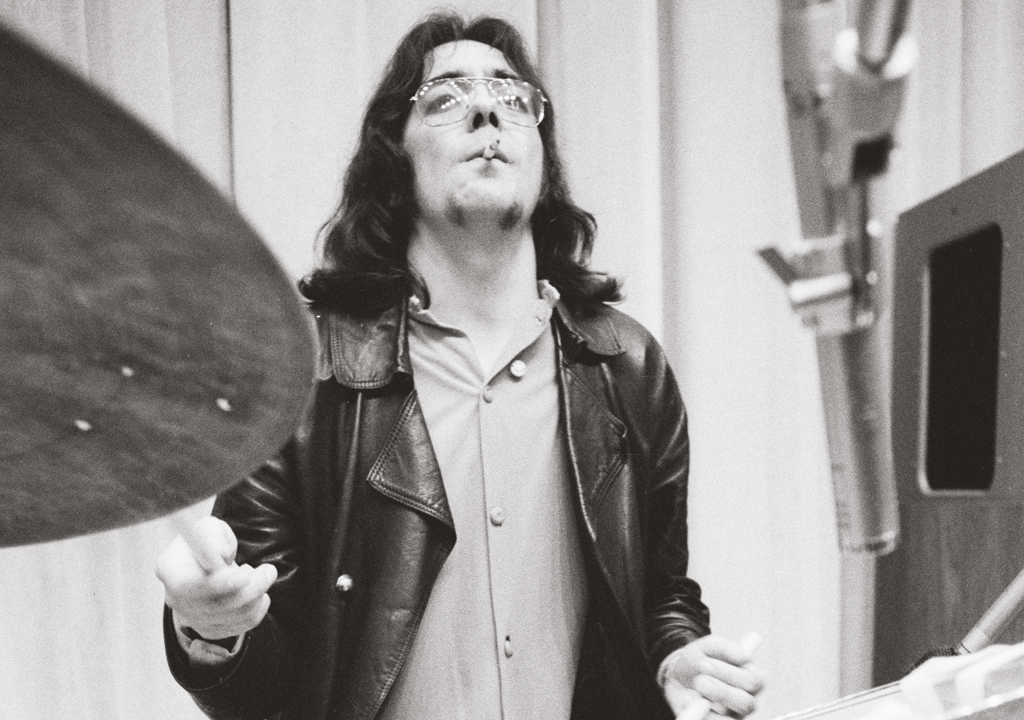
Above: Jim Keltner keeps the best for a “national treasure”.
Jim Keltner: “I’ve been on a lot of records with BB. The best one probably was BB In London, which was nominated for a Grammy in the 70s. Ain’t Nobody Home was the single. BB King is just one of the great gentlemen of our time. A national treasure.”
Although BB King’s admiration for Peter Green extended to the oft-quoted statement that “he has the sweetest tone I ever heard; he was the only one who gave me the cold sweats”, the Fleetwood Mac main man’s involvement in the album is limited to just one track, the 1945 jump blues Caldonia, first recorded by Louis Jordan.
BB King: “In the studio he [Green] was quiet and I got the impression that he was very disillusioned with the whole music business. He played great on Caldonia, but the way I remember him is sitting around. I was just pleased to share his company, and he seemed to get some comfort from mine.”
Dave Chapman: “For the album cover, Jay Lasker wanted me to get the prime minister, which was Edward Heath at that time, to meet BB and have their picture taken together. I said, ‘No, Jay, that’s never going to happen’, but I did take BB along to Downing Street and we stood outside Number 10 with the two coppers behind him. BB had his guitar case, which might well have had a machine-gun inside, but nobody batted an eyelid or even asked what we were doing. Security in those days was much easier than it is now.”
Jerry Shirley: “Years later, I met BB again and asked him if anything stood out in his mind from the London session, and he says, ‘Sure. When Bobby Keys and Jim Price were doing the brass on one of the tracks, they were behind sound baffles, so all you could see was their heads poking above the top and Jim Price was getting a blowjob from a chick while he was playing the trumpet. So he was getting his trumpet blown while he was blowing his trumpet.’”
Dave Chapman: “My overall memory is that everybody had a wonderful time, more smiles than I’ve ever seen during the making of an album, which was quite simply, I think, down to BB. He would treat some unknown young guitarist from Beckenham exactly the same as he would treat Eric Clapton.”
The album was released by ABC in the US on October 11, 1971, and its newly formed subsidiary Probe Records in the UK on November 19.
Dave Chapman: “It has to be admitted that, unfortunately, BB King In London didn’t do as well commercially in Europe as we wanted it to. It increased his profile, and improved his touring possibilities, but it didn’t reach the heights we’d been hoping for.”
Nevertheless, its success might be better judged by the fact that by the end of the year, Muddy Waters was recording in London, with Memphis Slim, Lightnin’ Slim and Eddie ‘Guitar’ Burns following in short order.
